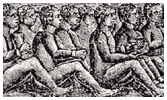 | 
 |
The slave trade comprises one of the most embarrassing chapters in European history. Its cruelties are shocking to those reading about them for the first time, and its extent multiplies that horror. From the 16th until the early 19th centuries, black slaves totaling nearly 12 million were brought from Africa to the New World , against their will, and forced to perform back-breaking labor under terrible conditions. The end of the slave trade was a gradual process, although the severity of it did not wane in its final years. The movement to abolish the slave trade was broad based and rather loosely associated, including economists, politicians, religious leaders and others. Eventually, the British slave trade was abolished in 1807, although illegal slave trading would continue for decades after that date. This paper will focus on the arguments that surrounded the debate regarding abolition (Britain’s debate will be the focus of this paper) and the circumstances under which the slave trade ended
Support for abolition in Britain dated back to the middle of the 18th century , but only many years later did Parliament seriously debate the subject. When it did, former slave turned abolitionist Equiano (Gustavus Vassa) was in no small part responsible. Though a slave until the 1770’s, E quiano’s writings to the Queen and elsewhere comprised the final chapter of his lifelong resistance to slavery, first as a slave and then as an abolitionist. His first-hand accounts of the treatment of slaves detailed the horrors perpetrated even against slaves that had bought their freedom. The account of Equiano provides some insight into the day to day life of a slave. In one instance, he witnessed the torture of one of his close friends and felt tremendous desire to die and thereby escape what he was seeing. Equiano’s frustration stemmed in part from the fact that he had purchased his freedom, and yet was betrayed by his attorney and tortured aboard the ship that was supposed to be sailing for his freedom. With liberty so close he could taste it, the shackles of slavery and dishonesty of slave owners became even more anguishing. In a nutshell, Equiano’s tale is a microcosm of the frustrations felt by slaves in the West Indies for hundreds of years, always facing one more obstacle in the quest for liberation. quiano’s writings to the Queen and elsewhere comprised the final chapter of his lifelong resistance to slavery, first as a slave and then as an abolitionist. His first-hand accounts of the treatment of slaves detailed the horrors perpetrated even against slaves that had bought their freedom. The account of Equiano provides some insight into the day to day life of a slave. In one instance, he witnessed the torture of one of his close friends and felt tremendous desire to die and thereby escape what he was seeing. Equiano’s frustration stemmed in part from the fact that he had purchased his freedom, and yet was betrayed by his attorney and tortured aboard the ship that was supposed to be sailing for his freedom. With liberty so close he could taste it, the shackles of slavery and dishonesty of slave owners became even more anguishing. In a nutshell, Equiano’s tale is a microcosm of the frustrations felt by slaves in the West Indies for hundreds of years, always facing one more obstacle in the quest for liberation.
Writing in 1777, Equiano was politically astute, and was aware of both the political and intellectual climate of the era. He recognized groups such as the Quakers who were unequivocally calling for immediate abolition of slavery and the slave trade, but he also made economic arguments similar to those of Adam Smith and his laissez-faire economic theory of the "Invisible Hand." Indeed, with the British Parliament locked in a heated debate over abolition (and what effects abolition would have on commerce), Equiano presented an impressive case outlining how liberating Africa would open up a whole new market for British industry. Ironically, and somewhat tragically, in the course of arguing for abolition Equiano and others raved about the possibility of missionary work in Africa. "Missionary work", however, would eventually result in colonization and severe exploitation of the continent. Regardless, Equiano’s arguments had striking similarities to those that William Wilberforce would employ with success in Parliament about ten years later.
One of the most important questions surrounding the abolition of the slave trade is this one: why did it happen? Was it the intellectual climate of the Enlightenment or the new economic fields that were opening up in India, or in the textile mills of Manchester, providing al ternatives to British entrepreneurs and investors? CLR James argues in his book The Black Jacobins that, despite all the soliloquies in Parliament on the "immorality" of the slave trade, only economic necessity that brought about abolition. British commerce was, of course, high on the list of priorities to members of Parliament considering abolition. The issues of "justice and humanity" were not the only issues considered in Parliament as the slave trade was discussed. The most notable orator in Parliament against the slave trade, William Wilberforce, argued that while, "justice and humanity" demanded "immediate abolition", the latter also served "the political interests of the British Empire." ternatives to British entrepreneurs and investors? CLR James argues in his book The Black Jacobins that, despite all the soliloquies in Parliament on the "immorality" of the slave trade, only economic necessity that brought about abolition. British commerce was, of course, high on the list of priorities to members of Parliament considering abolition. The issues of "justice and humanity" were not the only issues considered in Parliament as the slave trade was discussed. The most notable orator in Parliament against the slave trade, William Wilberforce, argued that while, "justice and humanity" demanded "immediate abolition", the latter also served "the political interests of the British Empire."
Arguments that the slave trade served "political interests of the British Empire" made sense in the context of the Parliamentary debate. Sir William Young, a St. Vincent planter, commented in 1791 that "(Should abolition occur) I presume not to measure the extent of ruin in the islands, and decay in commerce as dependent for a time on that with Africa…" . Many MP’s opposed ending the slave trade on the grounds that it would devastate British commerce. Some considered the slave trade a necessary evil, whereas others such as MP Vaughan argued that "he had seen nothing of the cruelties the Negroes spoke of." The former significantly outnumbered the latter, and this in part explains why supporters of abolition put so much effort into detailing the advantages of wage labor over inefficient slavery.
Even among those in favor of abolition, there was no consensus on the probable impact on British commercial interests of ending the slave trade. Adam Smith, classical liberal that he was, supported abolition and gave reasons why it would benefit the economy, although this is not to s ay that he supported abolition solely because of the economic arguments. The arguments he makes in The Wealth of Nations focus a great deal on how constrained labor conditions, such as those under mercantilism or slavery, fail to allocate resources in the most efficient manner. But many, including Sir William Young, remained skeptical regarding Smith’s analysis, and the debate over abolition most likely was not won on the strength of the Invisible Hand. By no means did such arguments overwhelm the lobbying of British sugar interests, who could not care less if slave labor "wasn’t allocated properly." In fact, the ending of the slave trade may very well have been a case of apparent "econocide" in the British West Indies. In fact, at the time of abolition of the slave trade the sugar islands were more profitable than they had been during the years from 1720-1775. ay that he supported abolition solely because of the economic arguments. The arguments he makes in The Wealth of Nations focus a great deal on how constrained labor conditions, such as those under mercantilism or slavery, fail to allocate resources in the most efficient manner. But many, including Sir William Young, remained skeptical regarding Smith’s analysis, and the debate over abolition most likely was not won on the strength of the Invisible Hand. By no means did such arguments overwhelm the lobbying of British sugar interests, who could not care less if slave labor "wasn’t allocated properly." In fact, the ending of the slave trade may very well have been a case of apparent "econocide" in the British West Indies. In fact, at the time of abolition of the slave trade the sugar islands were more profitable than they had been during the years from 1720-1775.
Less influential (though highly vocal) were abolitionist groups that supported abolition regardless of the economic consequences, including The Providence Society. They, along with the most radical of the abolitionists, believed that not only was the slave trade reprehensible ("an outrageous violation of all the rights of man" they called the "abominable slave trade with the Africans") but also that any association with it was "the work of the devil." Another irony is that the Providence Society supported paying for the Africans to go back to Africa if they wanted, as a means of truly spreading the gospel to that continent. Borrowing from pro slavery propaganda, abolitionist groups often accepted the idea that the Africans were "barbaric" and thus needed to be "civilized", claiming that this could best be accomplished by setting them free.
Religion, in fact, played a central role in the debate over abolition. Opposing groups such as the Quakers (to whom Equiano expressed his gratitude), there were those who argued that since blacks were not Christians, they were not worthy of liberty. This created a bi zarre circle of theological debate: the slaves were brought from Africa partly under the guise that they were to be Christianized/ civilized, but most only received education in the first principles of Christianity, which as CLR James points out "marked the beginning and the end of their education." On the other hand, the Quakers and Providence Society recognized the hostility the slaves must have felt towards Christians and, recognizing the damage this was doing to the cause of spreading Christianity, called for immediate abolition, often using scripture to support their arguments. zarre circle of theological debate: the slaves were brought from Africa partly under the guise that they were to be Christianized/ civilized, but most only received education in the first principles of Christianity, which as CLR James points out "marked the beginning and the end of their education." On the other hand, the Quakers and Providence Society recognized the hostility the slaves must have felt towards Christians and, recognizing the damage this was doing to the cause of spreading Christianity, called for immediate abolition, often using scripture to support their arguments.
But it may be a mistake to give too much weight to arguments made either in Parliament or elsewhere regarding abolition. As the account of Equiano demonstrates, slavery as an institution was in trouble under the pressure of a general resistance by the slaves, a counteroffensive that was finally making breakthroughs by the late 18th century. Still, the decision to enact legislation terminating British involvement in the slave trade was certainly of great historical significance. What abolition meant to the British Empire is an even more interesting question, one that remains far from settled.
|
Equiano, Olaudah. The Interesting Narrative of the Life of Olaudah Equiano. London: 1789.
Great Britain. Parliament, House of Commons. Abolitionist Debate. London: 1789.
Antsey, Roger. The Atlantic Slave Trade and British Abolition, (New Jersey: Humanities Press, 1975).
Drescher, Seymour. A Case of Econocide :British Abolition and Economic Development, quoted from.Antsey.
Hopkins, Samuel. Timely Articles on Slavery. (Miami, FL: Mnemosyne Publishing Inc., 1969).
|

 |





